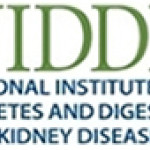- Industry: Government; Health care
- Number of terms: 17329
- Number of blossaries: 0
- Company Profile:
The National Institute of Diabetes and Digestive and Kidney Diseases (NIDDK) conducts and supports research on many of the most serious diseases affecting public health. The Institute supports much of the clinical research on the diseases of internal medicine and related subspecialty fields, as ...
Obesity is excess body fat. Because body fat is usually not measured, a ratio of body weight to height (see body mass index, or BMI, chart) is often used instead. It is defined as BMI. An adult who has a BMI of 30 or higher is considered obese.
Industry:Fitness
A fat that is solid at room temperature. Fats that are in foods are combinations of monounsaturated, polyunsaturated, and saturated fatty acids. Saturated fat is found in high-fat dairy products (like cheese, whole milk, cream, butter, and regular ice cream), ready-to-eat meats, the skin and fat of chicken and turkey, lard, palm oil, and coconut oil. They have the same number of calories as other types of fat, and may contribute to weight gain if eaten in excess. Eating a diet high in saturated fat also raises blood cholesterol and risk of heart disease.
Industry:Fitness
A fat that is liquid at room temperature. Vegetable oils are unsaturated fats. Unsaturated fats include polyunsaturated fats, and monounsaturated fats. They include most nuts, olives, avocados, and fatty fish, like salmon (see definitions).
Industry:Fitness
Fats that are in foods are combinations of monounsaturated, polyunsaturated, and saturated fatty acids. Monounsaturated fat is found in canola oil, olives and olive oil, nuts, seeds, and avocados. Eating food that has more monounsaturated fat instead of saturated fat may help lower cholesterol and reduce heart disease risk. However, monounsaturated fat has the same number of calories as other types of fat, and may still contribute to weight gain if eaten in excess.
Industry:Fitness
(1) The process of the body using food to sustain life. (2) The study of food and diet.
Industry:Fitness
A building block for most carbohydrates. Digestion causes some carbohydrates to break down into glucose. After digestion, glucose is carried in the blood and goes to body cells where it is used for energy or stored.
Industry:Fitness
Achieving and maintaining a healthy weight by eating nutritious foods and being physically active.
Industry:Fitness
A hormone made by the pancreas (see definition) that helps move glucose (sugar) from the blood to muscles and other tissues. Insulin controls blood sugar levels.
Industry:Fitness
All of the processes that occur in the body that turn the food you eat into energy your body can use.
Industry:Fitness
Compounds made up of fat and protein that carry fats and fat-like substances, such as cholesterol, in the blood.
Industry:Fitness
